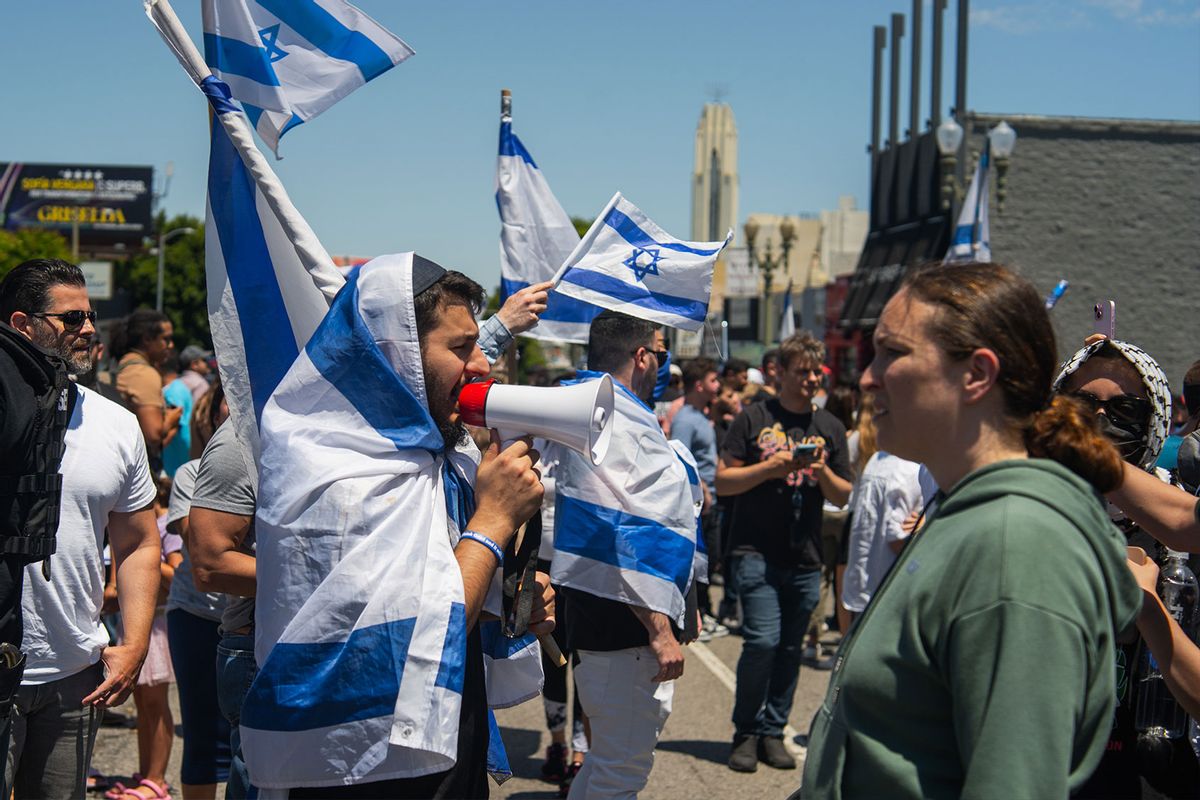Leading Democratic elected officials, from Los Angeles Mayor Karen Bass to California Gov. Gavin Newsom to President Biden, have spoken out to condemn the pro-Palestinian activists who protested in front of the Adas Torah synagogue on the west side of Los Angeles last Sunday.
Jewish, Israeli and conservative leaders, including Amanda Berman, founder of the American Jewish group Zioness, Israeli special envoy Michal Cotler-Wunsh, Ellie Cohanim of the Independent Women’s Forum and numerous others have described the protest as a “pogrom,” a phrase echoed in a New York Post editorial on Tuesday.
Newsom said, “Such antisemitic hatred has no place in California,” adding, "There is no excuse for targeting a house of worship.”
Except that in this particular case, that's not an accurate description of what happened, and there was a legitimate reason for holding a protest outside a Jewish house of worship. While many news reports have barely mentioned this, the demonstrators were not outside that synagogue to protest Jews in general, the Jewish faith, Zionism or even Israel — they were there to protest the sale of land in illegally occupied Palestinian territory.
The target of the protest was not Adas Torah itself but a group called My Home in Israel, which was holding a real estate marketing event at the synagogue. As Forbes reports, the group purchased a full-page ad in the June 21 issue of the Jewish Journal, a Los Angeles weekly newspaper, promoting the event at Adas Torah and another Southern California location with this pitch: "Come and meet representatives of housing projects in all the best Anglo neighborhoods in Israel.”
According to the Los Angeles-area office of the Council on American-Islamic Relations, this marketing campaign is promoting “racially segregated settlements, where only Jewish people are allowed to live, on illegally-occupied Palestinian land.”
One pro-Palestinian demonstrator held up a sign saying "Israeli Jew against land theft," while another displayed a sign with the slogan “Jews Against Genocide.” Social media posts announcing the protest stated “Our land is not for sale” and called on demonstrators to “Stand against settler expansion at Sunday’s real estate event.”
We need your help to stay independent
Under the terms of U.N. Security Council Resolution 446, which was passed in 1979 and reaffirmed in 2016, “the policy and practices of Israel in establishing settlements in the Palestinian and other Arab territories occupied since 1967 have no legal validity and constitute a serious obstruction to achieving a comprehensive, just and lasting peace in the Middle East.”
Under the current right-wing government of Prime Minister Benjamin Netanyahu, the rate of Israeli settlement building in the occupied West Bank has increased dramatically. A 2023 U.N. study found that almost 30,000 new housing units had been proposed in Palestinian territory within the first six months of that year.
Those who have condemned the protests as targeting a Jewish “house of worship” are missing a crucial point. This marketing event took place on Sunday, which is not the Jewish day of worship.
Many Israeli organizations and individuals, including B'tselem, also known as the Israeli Information Center for Human Rights in the Occupied Territories, condemn both the occupation itself and Israel's settlement policy as illegal violations of Palestinians' human rights. The Israeli government and its allies reject the U.N.’s characterization of the Israeli occupation and settlement policy.
One could fill volumes airing both sides of this debate, but whether one agrees with the U.N. or the Israeli government is not the point. Pro-Palestinian protesters had legitimate reasons to protest outside Adas Torah, and were not targeting Jewish individuals or the Jewish religion.
Furthermore, Biden, Newsom, Bass and others who have condemned the protests as targeting a Jewish “house of worship” are missing a crucial point. This marketing event occurred on a Sunday, which is not the Jewish day of worship. Shabbat runs from sunset on Friday to sunset on Saturday. This demonstration on a Sunday afternoon was not interfering with Jewish religious services.
Of course it's possible for protesters’ legitimate grievances to spill over at times into inaccurate, overblown offensive or outright antisemitic rhetoric, and even into violence. But those possibilities cut both ways: The regrettable violence at the Adas Torah protest involved clashes between protesters rather than antisemitic attacks.
Want a daily wrap-up of all the news and commentary Salon has to offer? Subscribe to our morning newsletter, Crash Course.
Numerous media outlets have reported that one person was arrested at the protest, a demonstrator described as carrying a “spiked post.” But most reports have neglected to say that the person arrested was a pro-Israel demonstrator.
In a widely-circulated post, British journalist Nioh Berg claimed, “They're beating up Jewish women in LA in broad daylight now,” and others posted this photo of the “Jewish woman.” In fact, the pro-Israel counter-protester in question is a young man named Naftoli Sherman, who had a pro-Palestinian protester in a headlock and ended up bloodied.
The reaction to this event from politicians, Jewish leaders and the media has followed an unfortunately familiar pattern: Pro-Palestinian protesters are libeled as antisemites, often on the basis of inaccurate or ambiguous evidence, and their worst moments are portrayed as indicative of the whole movement. In the process, Palestinians' legitimate grievances are dismissed.
Both of my grandfathers escaped the antisemitic pogroms of early 20th-century Russia — massacres perpetrated by ultra-nationalist "Black Hundreds" thugs egged on by Tsar Nicholas II, known as "Bloody Nicholas." For American leaders today, Jewish and otherwise, to draw an analogy between last Sunday's legitimate protest and the murderous pogroms of that era demonstrates how unreasonable the American reaction to pro-Palestinian protests has become.



Shares